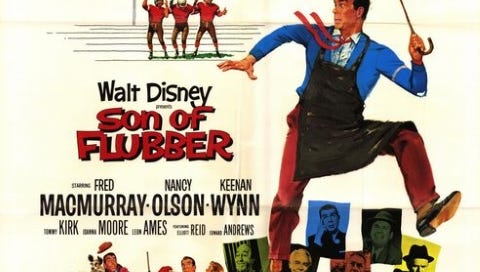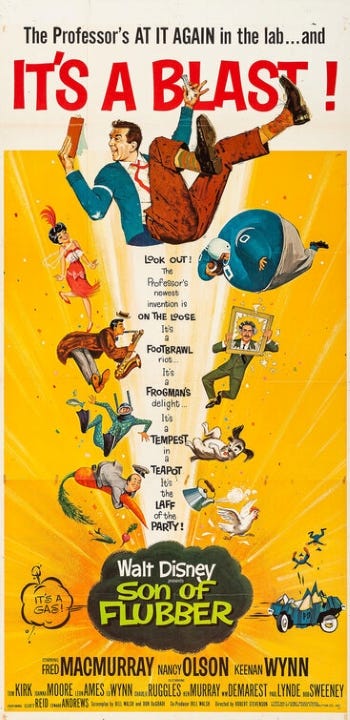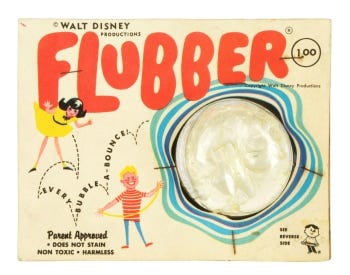Disney Plus-Or-Minus: Son Of Flubber
Son Of Flubber was Walt Disney’s first sequel, with an asterisk. Nearly twenty years earlier, he released The Three Caballeros in response to the tremendous response to Saludos Amigos. Caballeros is every inch a follow-up to Amigos but since neither of those movies follow a narrative framework, they don’t entirely count. The same could be said of Melody Time, a spiritual sequel to Make Mine Music. Then there’s Davy Crockett And The River Pirates. It’s obviously a sequel (well, prequel) to Davy Crockett, King Of The Wild Frontier. But they were originally produced for TV, not the big screen. So sure, if you take all of those sequels-but-not-really out of the equation, Son Of Flubber was first.
That’s certainly a distinction Walt himself would have made. He had explicitly stated in interviews that he didn’t like sequels. He didn’t seem to have any compunction about going back to the same well and trying to make something the same but different. But sequels, especially in those days, weren’t supposed to offer anything but more of the same. If that’s what Walt Disney’s definition of a sequel was, he absolutely delivered on it with Son Of Flubber.
The gang’s all here from The Absent-Minded Professor. Everyone from director Robert Stevenson and screenwriter Bill Walsh on down to Fred MacMurray and Charlie the dog returned for part two. The movie picks up almost exactly where the first one left off. Professor Brainard (MacMurray) and his new assistant, Biff Hawk (Tommy Kirk), are flying the Model T down to Washington hoping to collect some of that sweet, sweet government money they’ve been promised. Unfortunately, that’s going to take some time. The Secretary of Defense (Edward Andrews) explains the labyrinth of red tape that must be navigated in order to maximize their eventual pay-out. Why settle for less when you could get more? So Brainard and Biff are forced to return to Medfield College empty-handed, except for vague promises that it’ll all be worth it someday.
As always, the financially strapped Medfield needs the money now. The college has made plans for an elaborate new science center, Flubber Hall. When Biff’s father, Alonzo P. Hawk (Keenan Wynn), discovers that Brainard didn’t get the money, he gleefully announces plans to bulldoze the entire campus on the first of the month unless his loan is repaid.
Meanwhile, Brainerd is having some domestic troubles with his new bride, Betsy (Nancy Olson). She’s being courted by some Madison Avenue types (led by comedian Ken Murray) who want to buy the rights to Flubber. They dazzle her with the promise of furs, pearls and a million dollar check and come armed with sample commercials for such products as Flubberoleum, a revolutionary bouncy floor guaranteed to change the lives of Mr. and Mrs. Suburban America. But once Brainard admits that his government contract prevents him from selling Flubber to anyone else, the ad men pack up and leave.
As they walk out, a man from the government (Bob Sweeney, last seen in Moon Pilot) walks in. However, the agency this government man represents is the IRS, not the Defense Department. He’s here to collect the tax on the prospective earnings reported by Brainard based on the millions he’s been promised. The fact that he hasn’t actually received any of that money yet doesn’t matter. When Brainerd tells the heartless taxman that he’d probably put his own mother in jail, Mr. Harker assures him that he already has for unreported income on her homemade jams and jellies.
In desperate need of money (and refusing to let Betsy go back to work as a secretary for his once-and-future rival, English professor Shelby Aston, again played by Elliott Reid), Brainerd gets back to work on his latest invention. Flubbergas appears to have several interesting properties but Brainerd hopes it will allow mankind to control the weather. A successful experiment made it rain inside from the steam off a boiling tea kettle. But when he tries to go bigger by aiming it at a distant cloud, it doesn’t appear to work. It does, however, shatter every last piece of glass within its reach, unbeknownst to Brainerd.
Biff, in the meantime, is working on an alternative use for Flubbergas. With his pal Humphrey (Leon Tyler, one of the basketball players from the first film) acting as guinea pig, Biff tries to create an inflatable football uniform that allows the player himself to be thrown into the end zone. His experiments aren’t entirely successful, unless his goal was to repeatedly destroy the chicken coop owned by Brainerd’s neighbor, milkman Mr. Hummel (played by Preston Sturges regular William Demarest, a couple of years before he joined the cast of MacMurray’s sitcom My Three Sons as Uncle Charley).
MEANWHILE meanwhile, Shelby Aston is up to his old tricks, trying to steal Betsy away from Brainard, and this time he’s brought a secret weapon. He invites Brainard’s old girlfriend, sexpot Desiree de la Roche (Joanna Moore), over to dinner at the Brainards. Betsy eventually becomes convinced that Desiree and Brainard have rekindled their old affair, so she leaves him, temporarily moving in with her old boss, Medfield College President Rufus Daggett (Leon Ames) and his wife (Harriet MacGibbon).
As for all that broken glass, Alonzo Hawk’s insurance company has been left holding the bag for thousands of dollars in claims. He figures out that the whole thing started at Brainard’s house and proposes another crooked deal, using the Flubbergas in service of an elaborate insurance scam. Brainard refuses, of course, and Hawk threatens to bring the full force of the law down on him.
Despondent over all these setbacks, Brainard agrees to help Biff out with his project. This time, the inflatable football uniform works and Medfield trounces rival Rutland College in essentially a replay of the first film’s basketball game. Brainard has no time to savor the victory, however. Hawk makes good on his threat and the police arrive to haul Brainard off to jail.
Brainard looks to be in a tight spot until Buzz turns up at his trial with a surprise witness. It’s none other than Ed Wynn, one of the only actors from the original Absent-Minded Professor who does not reprise the same role here. Now he’s the Chief Agricultural Officer and he presents evidence that Brainard’s invention does work, just not in the way he intended. The Flubbergas has somehow supercharged the atmosphere, turning Medfield’s formerly barren farmland lush and verdant, producing giant-sized fruits and vegetables. Wynn dubs the phenomenon “dry rain”. Brainard is once again a hero and the case is dismissed, despite overwhelming evidence that he was clearly guilty of the charges he faced.
Believe it or not, I did not have high expectations going into Son Of Flubber. The Absent-Minded Professor is a fun little movie but there’s nothing about it that left me saying, “More of these characters, please.” But here’s the thing. Son Of Flubber is actually a surprisingly good, funny sequel. That is, right up to the point where, all of a sudden, it isn’t.
The first several scenes are terrific. Walsh’s screenplay takes aim at government inefficiency and absurd tax laws and lands quite a few hits. Disney had previously lobbed some softballs at Uncle Sam in Moon Pilot but the jokes here are funnier and fresher. The sequence with the ad men pitching their ludicrous products is even better. The sight of a typical suburban dad bouncing his baby off a Flubberized floor will never not be funny. This is all good stuff suggesting we’re about to get a smarter, more satirical movie than is actually coming.
The trouble starts when Walsh and Stevenson decide to refocus on Brainard’s latest experiment. From here, they seem content to simply deliver a rehash of the first film. The football game apes the rhythms and gags of the basketball game down to the second. Even Paul Lynde, making his film debut as the game’s color commentator, can’t liven things up. Once again, Brainard flies his Model T over Shelby’s car and once again, Shelby crashes into James Westerfield and Forrest Lewis, the cops from The Absent-Minded Professor and The Shaggy Dog. This time, Brainard floods Shelby’s car with rain, which is admittedly kind of a cool effect. But the punchline to the gag is the same.
The movie’s biggest problem is its focus on Brainard and Betsy’s marital problems. Try to set aside the fact that they’re completely rooted in retrograde stereotypes. Brainard’s “no wife of mine is going to work” attitude will have modern women rolling their eyes, while modern men will (hopefully) be equally insulted by Brainard’s total inability to even feed himself without his wife. No one ever accused Disney of having progressive views on marriage.
The bigger issue is that we’ve seen all this before. The triangle between Brainard, Betsy and Shelby was already one of the weakest elements in the first film. Bringing Desiree into the mix does nothing to change that. We already know that Betsy’s willing to put up with a lot from her husband. The guy left her standing at the altar three times, for crying out loud. She ought to be smart enough to see through Shelby’s transparent attempt to wreck her marriage.
The Brainards’ marital woes are endemic of the film’s tendency to repeat itself. A love triangle was part of the first movie, so it needs to be part of the new one whether or not it makes any sense for the story or the characters. It’s also one subplot too many in a movie that’s already overstuffed with dangling plot threads. The business with the taxman is smart and funny but it’s forgotten the second Bob Sweeney leaves the picture. The same goes for the ad men and the brass down in Washington.
None of that seemed to matter much to critics and audiences in 1963. Most critics agreed that even though Son Of Flubber wasn’t as fresh and original as The Absent-Minded Professor, it still breezed by on its light, buoyant tone. Audiences turned out in droves. The movie premiered in January of 1963 and went on to become the sixth highest-grossing movie of the year, behind much bigger movies like Cleopatra, How The West Was Won, It’s A Mad, Mad, Mad, Mad World, Tom Jones and Irma la Douce. It was a bright spot in an otherwise so-so year for the studio.
I can’t end this entry without discussing the Great Flubber Fiasco of 1962-63. In the autumn of 1962, Disney teamed up with toy company Hassenfield Brothers (who would shorten their name to Hasbro by the end of the decade) to mass produce Flubber, a bouncy, stretchy glob that was more or less the same as Silly Putty.
Kids loved Flubber but shortly after the release of the film it was meant to promote, reports started to surface of an outbreak of skin rashes in schools nationwide. Flubber appeared to be the cause and, while nobody at Hassenfield Brothers or Disney ever stepped up to claim responsibility, the bad press was enough to doom the product. By May, Hassenfield decided to yank Flubber off the market.
This is where it gets really fun. Hassenfield Brothers now had a whole lot of potentially toxic Flubber and no idea how to get rid of it. Landfills flat out refused to accept it. Burning it produced a thick, greasy black smoke that stank up the vicinity for miles. They tried to sink it in a lake but the Flubber balls just floated right back up to the surface.
Finally, Hassenfield Bros. just did as Atari would do years later with their unwanted E.T. video game cartridges. They dug a big pit, buried the Flubber and built an employee parking lot on top of it. And supposedly, that’s where Flubber is to this day, buried beneath Delta Drive in Pawtucket, RI. Some say that on hot days, the Flubber bubbles up through cracks in the asphalt. That, along with some of the other details of the story, might be a bit of an exaggeration. But this is the kind of story where it’s more fun to print the legend.
For the time being anyway, Walt Disney was through with Flubber. The studio wouldn’t touch the stuff again until the 1988 TV remake of The Absent-Minded Professor. But we have not seen the last of Medfield College, Alonzo P. Hawk, or most of the film’s cast and crew. Almost everybody will be back in this column sooner or later. Those Disney contracts must have been written on Flubber. People keep bouncing back for more.
VERDICT: The first half is a Disney Plus but the second is a Disney Neutral at best.






